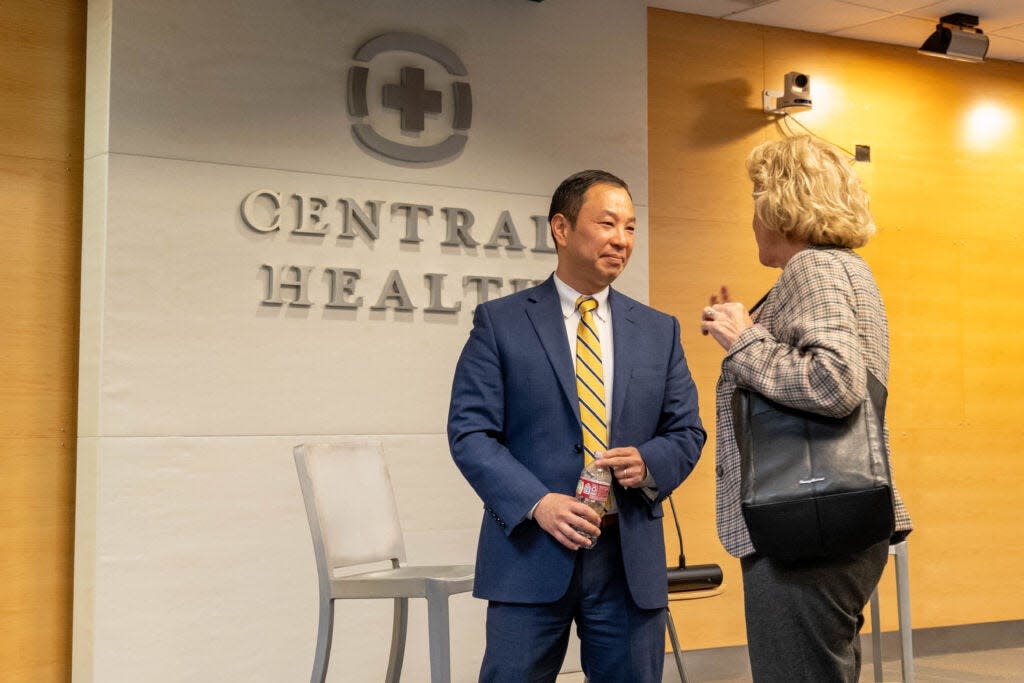After seven years, lawsuit over Central Health payments to Dell Medical School in court
After seven years of depositions, finger-pointing and press conferences, attorneys for Central Health and taxpayers who filed a 2017 lawsuit against the hospital district finally made it into civil court Thursday.
At the core of the lawsuit is the question: Is the $35 million annual payment Central Health makes to Dell Medical School legal?
Central Health gave this money after voters approved a tax increase to help build a medical school in 2012. It continues to make the payments to help build health care infrastructure in Central Texas, according to its legal filings. The plaintiffs, Rebecca Birch, Richard Franklin III and Esther Govea, argue that this annual payment and gifts to other nonprofits are outside Central Health's legal spending limits, which the plaintiffs say is limiting to providing medical care to people with lower incomes.

Central Health, the hospital district for Austin and Travis County, provides health care for people at or below 200% of the federal poverty level. It does this mainly through its Medical Assistance Program, which is similar to an insurance for people who don't qualify for Medicaid or Medicare and can't afford private insurance. It is funded by a property tax rate of 10.0692 cents per $100 valuation.
The hearing allowed both sides to make arguments and 201st Civil District Court Judge Amy Clark Meecham to ask questions. A ruling is expected in the coming weeks.

What does each side want?
Central Health wants the lawsuit to be dismissed. If Meecham doesn't dismiss it, then Central Health is asking for her to find that the funding is legal.
The plaintiffs are asking for the judge to issue an injunction to prevent Central Health from making any further payments to Dell Medical School that are not for funding direct medical care or medical care administration. It is not asking for a return of the $385 million the school has received from Central Health.
Plaintiffs' attorney Manuel Quinto-Pozos said the issue is not "whether it's good to have a medical school in Austin. That is fine. What is not fine is for taxpayer money that is intended only for health care for the poor to pay for those things."
Both parties have more files to give Meecham to consider; then she will review them and issue a ruling.
"It went fine," plaintiffs' attorney Fred Lewis said after Thursday's hearing. "The judge gave us plenty of time. We had our day in court."
Ted Burton, Central Health's chief communications officer, issued this statement: "Central Health is pleased to have had the opportunity to present our case today in court. It is time to bring this lawsuit to a close and focus on advancing the well-being of our community and, most importantly, our patients."
Even after the ruling, this might not be the end of this case. The plaintiffs expect to appeal if Central Health wins its argument and the lawsuit is dismissed.
What is Central Health's argument?
Central Health attorney Sinead O'Carroll said statutes allow a hospital district to provide beyond the health services listed in the statutes. Other rulings have approved a health district building a dialysis center, an imaging center and a doctor's office.
She said helping build Dell Medical School has improved patient access to health care because of the additional residency programs it has added; the specialists and subspecialists it has attracted; and the UT Health Austin clinics that have reduced the waiting lists to see a specialist.
She quoted Dell Medical professor Dr. Amy Young: "Medicine is a team sport."
"Research enhances clinical care," O'Carroll said. "Education enhances clinical care. And clinical care enhances research and education."
Why are the plaintiffs upset about funding Dell Medical School?
Quinto-Pozos likened the spending of Central Health to when he went to college and his parents gave him a Texaco card and a Southwestern Bell card that could only be used for gas for his car and to make telephone calls respectively and nothing else. The Texas Constitution and state health statutes have "given the equivalent of those credit cards," Quinto-Pozos said. "It can only use that for health care for the poor, but what Central Health has been doing is using those credit cards for all kinds of things."
Quinto-Pozos said that spending taxpayer money meant for providing health care for other things is illegal.
Central Health has said the legality of the Dell Medical School payment was cleared before the vote in 2012, and it is following the mandate of the voters, as well as fulfilling the legal agreement it entered with Dell Medical School after the vote.
"The voters have no authority to expand Central Health's legal authority," Lewis said. He said that could only be done by an amendment to the state constitution.
Through Dell Medical School records, the plaintiffs said only 10% of the $35 million annual payments to the school represent direct medical care or administration of that care.
"It went to education, research and general operations of the medical school," Lewis said.
Judge Meecham asked if the funding was illegal, why didn't the plaintiffs take it to the Texas attorney general instead of a civil court?
The $35 million is even more complicated
Initially, the $35 million didn't come directly from Central Health. When the medical school was beginning to be built, Texas received federal money to improve health care access to Medicaid and health care for people with low incomes. The state created the Delivery System Reform Incentive Payment program to distribute the money. To participate in this program, local entities had to match the program's funds.
Central Health and the Ascension Seton hospital system formed the Community Care Collaborative in 2013 to receive and match the funds, which could then be used to make the $35 million annual payment to the medical school. The collaborative created an affiliation agreement with the new medical school. That agreement is for 25 years with an automatic renewal of an additional 25 years.
The collaboration's documents provide that if no other funds are available, then Central Health would serve as the guarantor for the $35 million payment to the medical school.
The Delivery System Reform Incentive Payment program funds ended in 2021, and Central Health is now the sole provider of the annual payment. Both Central Health and Ascension Seton stopped funding the collaborative in 2020 as tensions between those parties grew. Currently, Ascension Seton and Central Health are suing each other over this agreement. They also disagree on Central Health's reimbursement of the care Ascension Seton provides and on the number of patients on Central Health's MAP program who receive care from Ascension Seton.
Without the medical school, "Central Health would not be able to provide the same level of care," she said.
Asking questions
Central Health asked Meecham to dismiss the lawsuit because of jurisdictional issues. Halfway through the Central Health's presentation, Meecham stopped to ask questions: Was Central Health's attorney focusing on a dismissal for lack of jurisdiction because taxpayers aren't typically allowed to sue a government body, or was it trying to show the merits of the money for the medical school and its legality?
The answer was both.
"Your conception of jurisdiction and my conception is different," Meecham said. She pointed out recent appeals that have allowed taxpayers to sue government entities.
To the plaintiffs, Meecham asked: How is your case a lawsuit? Is this just a political argument that you have with Central Health?
Even more questions
This lawsuit was filed as Central Health itself began asking Dell Medical School to provide data on how many low-income patients its doctors, medical students and residents serve. Dell Medical School has said it does not keep such data and it would be cost prohibitive to do so.
At the same time, an independent performance audit of Central Health is being done by Mazars USA LLP. That audit was ordered in 2022 by Travis County commissioners, who oversee the Central Health budget. The audit is expected to be completed in June.
This article originally appeared on Austin American-Statesman: Lawsuit over Central Health's payments to Dell Medical School in court
